The Top Shelf: Case Files 066-075: "...And My Lombax!"
By Mento 0 Comments
Welcome to The Top Shelf, a weekly feature wherein I sort through my extensive PS2 collection for the diamonds in the rough. My goal here is to narrow down a library of 185 games to a svelte 44: the number of spaces on my bookshelf set aside for my PS2 collection. That means a whole lot of vetting and a whole lot of science that needs to be done, ten games at a time. Be sure to check out the Case File Repository for more details and a full list of games/links!
Case File 066: Volition's Summoner 2
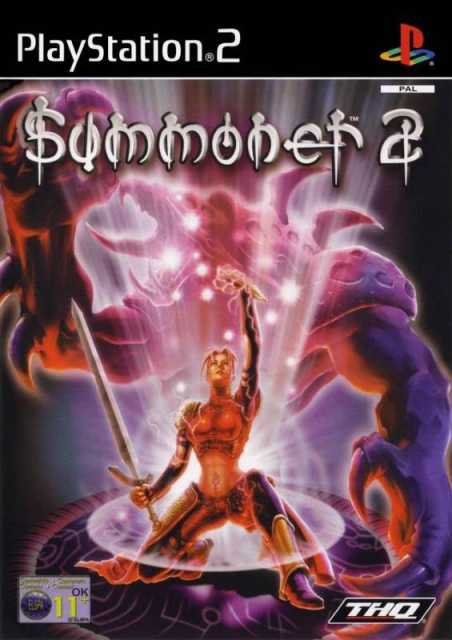
- Original Release (NA): 23/09/2002
- Not PS2 Exclusive (also has a slightly improved GameCube port)
You'll notice that The Top Shelf has a theme this week. Specifically, they're all games that were first released in the States (if not all created by American developers) and can all be found on other systems. A quirk of the chronological order I'm using, I guess. On the plus side, that means you've almost certainly heard of these games before, so I can dispense with the usual long-winded descriptions and skip ahead to my appraisals. Summoner 2 is the one case this week where I can't do that so easily because I've never actually played it. All I know about it is that it takes the same basic model of the first Summoner - you summon things - and switches its protagonist from a milksop with goofy 90s hair to a badass warrior princess who doesn't wear much and who might also have some 90s hair going on. If I recall correctly, I could never get my PS2 copy to work and ended up buying the GameCube version instead. That I bought two versions of the game and never played it probably says a whole lot about me that I wouldn't normally be comfortable disclosing.
I'm tempted to just eliminate this one since I didn't - and indeed, cannot - actually play it, but I would like to do right by the game at some point in the future. Maybe I'll squeeze in a playthrough of the GameCube game later down the road in an unrelated feature. Eliminated.
Case File 067: Sucker Punch's Sly Raccoon
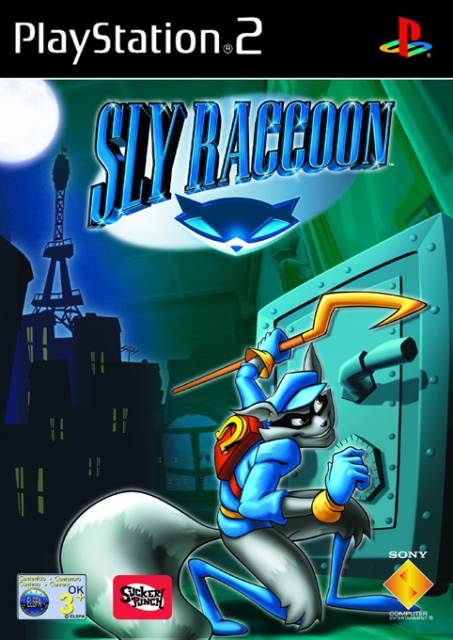
- Original Release (NA): 23/09/2002
- Not PS2 Exclusive (rereleased in a HD collection for PS3 and Vita)
Well, here we are. There's a triumvirate of enormous 3D platformer franchises that started life on the PS2 and Sly Raccoon (also known as Sly Cooper and the Thievius Raccoonus, a wordier title that the European and Japanese versions condensed) is the second of those. (NB: The first, Jak and Daxter, was covered a few weeks ago.) I like the original Sly plenty, but it's apparent in retrospect that the franchise was still finding its own place in the 3D platformer pantheon. The game has its ideas, not to mention a distinct cel-shaded look that would persevere to all its sequels, but is beholden to a linear route structure that later games would break away from with better returns. The plot essentially revolves around Sly recovering his family's legendary book of thief techniques from the team of villains who conspired to murder his parents, and in so doing learns his heritage as a master thief as well as avenging his fallen kin. With this, the game can spoon-feed new abilities to the player and create increasingly more elaborate levels that might take advantage of those acquired skills: for instance, learning to stand on top of points like a ninja leads to more precarious platforming in later levels. It's an elegant enough system, plus the game handles stealth well even this early on with its arrangement of visual and sound cues, and the game's bosses can be fairly memorable too: I doubt I'll ever forget trying to defeat the obnoxious voodoo alligator boss Mz. Ruby by DDR-ing at her real hard.
You know what's coming though, right? For as much as I'm happy and willing to acknowledge the importance of the first Sly Cooper game, the sequel was superior in every way. Sly 2: Band of Thieves not only re-engineered its level design to be a little more open and exploratory, but there was a significant boost in the level of imagination involved in planning and performing each level's "heist", with various missions designed to set the stage for a big finale. The way all those disparate preparation missions came together at the end was very satisfying, and the sequel also makes great use of Sly's partners-in-crime and fellow orphans Murray and Bentley, giving them their own tasks to do as playable characters with distinct gameplay differences. While the first Sly might fade into the shadows, know that its highly regarded sequel will keep the Cooper line alive in this feature. Eliminated.
Case File 068: IO Interactive's Hitman 2: Silent Assassin
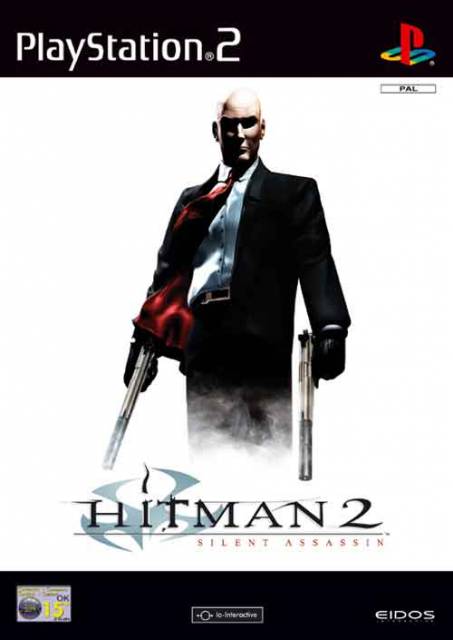
- Original Release (NA): 01/10/2002
- Not PS2 Exclusive (also has PC, Xbox and GameCube versions)
Talking of fading into the shadows, I'd completely forgotten before sifting through my collection that I'd ended up with one of IO Interactive's Hitman games. It's a series that's seen a major resurgence of late, thanks in no small part to the spaghetti-tossing monkeyshines of the Giant Bomb crew, and like many I'd never been particularly interested in the series previous to last year because of its demanding stealth structure, a slow pace borne of tireless observation, and a requisite level of unerring precision. As the titular hitman, the player has to stay incognito long enough to remove their target(s), which means a lot of changing outfits and setting up the perfect assassination by closely studying their surroundings and the people milling to and fro for opportunities. The series always struck me as one ideal for the PC gamer, perhaps due to the number of moving parts and the amount of contemplative strategy involved, and beyond the occasional CRPG I rarely left my console comfort zone in the late nineties and early aughts. I've long had an aversion to "pure" stealth-based games also, which is why I didn't play Hitman and Metal Gear Solid until fairly recently and have yet to touch a Splinter Cell game. That's softened of late, since I've become more appreciative of slower-paced games in my old age.
With a certain newfound appreciation of what this series is and does, I am interested to see how the second game compares to its modern descendent. I imagine its mechanics and level design are fairly archaic compared to the 2016 game given that there's twelve years, two console generations and three other Hitman games separating the two, but I'd be willing to check it out for my own curiosity's sake if nothing else. Considered.
Case File 069: Free Radical's TimeSplitters 2

- Original Release (NA): 09/10/2002
- Not PS2 Exclusive (also has Xbox and GameCube versions)
When I eliminated TimeSplitters it was with the understanding that it was eclipsed by its sequel, which is a clause I've been invoking a lot so far. TimeSplitters 2 doesn't make any huge changes to the existing single-player format - you're still warping into stages based on various time periods, completing a handful of objectives and finding the time portal exit - but the multiplayer was vastly expanded to include many more game modes, characters, weapons and other unlockables. If I recall correctly, the unlockables were obtained by completing "challenges" - scenarios engineered by the developers through the multiplayer match creation tools with all sorts of crazy rules and conditions, and special characters and weapons that might eventually be unlocked later. Perfect Dark did this also, I believe, and it was a wonderful way to implement a multiplayer mode that featured customizable bots that you could enjoy as a single player in tandem with the traditional story mode. My enduring memories of the game was working my way through the list of unlockables, marvelling at the sheer amount of diverse single player content an FPS game could present.
I maintain that TimeSplitters 2 is the last remnant of when console FPS games were... maybe not at their peak, but at the end of a specific evolutionary chain which was more appealing to me personally than where FPS games are at presently, though Overwatch's championing of a character-specific powers and personalities approach perhaps hearkens back to that era more than it does the dry Call of Duty shenanigans that had dominated the console FPS space for the past decade. TimeSplitters 2 isn't afraid to be goofy and imaginative in the ways GoldenEye and Perfect Dark could be, and for my money is probably the best FPS multiplayer game for the PS2. Yet, I feel I still need to check out its various modes again to ensure I'm not misremembering any of the above. It has been a long time, after all. Considered.
Case File 070: WXP Games's The Lord of the Rings: The Fellowship of the Ring
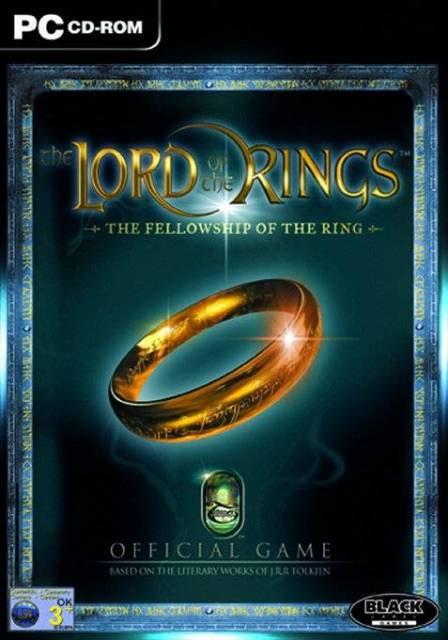
- Original Release (NA): 15/10/2002
- Not PS2 Exclusive (also has Xbox, PC and GBA versions)
It wasn't until I started researching for this feature that I noticed a curious thing about the Lord of the Rings licensed games, developed to tie in with Peter Jackson's sprawling trilogy which at this time was in full marketing mode for the second movie, The Two Towers. The Fellowship of the Ring and The Two Towers games play very differently, the former adopting more of a traditional BioWare-style RPG with heavier emphasis on exploration and side-questing while the latter is a very generation-specific model of streamlined cinematic action-RPG-brawler that would be seen a few more times, including its sequel The Return of the King and the D&D-themed Forgotten Realms: Demon Stone. What's odd is that the two games were released the same month, days from one another. What had apparently happened was that Vivendi, the publishers of this game, had the license rights to the Tolkien novels while EA, the publishers of The Two Towers, only had the movie rights. The Fellowship of the Ring, then, was a game that could incorporate more of the lore and details from Tolkien's original novel, aspects that the movie had to cut for the sake of brevity (not that "brevity" is usually a word I'd use to describe Jackson's trilogy...). I'd say that would give this game an edge over EA's output, but... well, I don't recall it being all that great. It's certainly true to the source material, and didn't rush its own development to meet the movie premiere of The Fellowship of the Ring in December 2001, but drawing from the novel also cursed it with its glacial pace. Especially early on, where it took five hours to leave the Shire and spent most of that time elaborating on the extended family tree of the Bagginses, Tooks and Proudfoots. In-game, this is justified as a slightly longer intro chapter to tutorialize the player with the controls and gameplay systems before summoning the Nazgul to hurry things along like the proverbial Baron von Blubba, but I remember getting a little burned out with all those early Candlekeep-tier fetch quests. It seems a lot of the reviews at the time didn't care for its presentation or gameplay either.
Naturally, I'm inclined to give this one another go, since I am curious to see how it differentiates itself not only from the EA games but from the movies, taking advantage of the literary license as it does. I don't imagine it'll be a full playthrough, but I do want to set the record straight on whether it or the EA games have aged the best. Considered.
Case File 071: Stormfront's The Lord of the Rings: The Two Towers
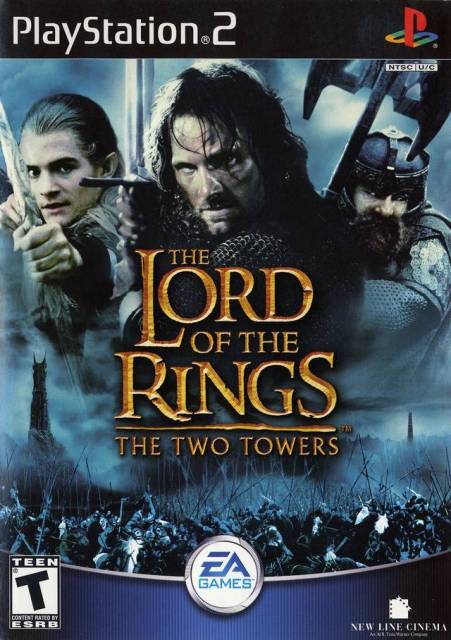
- Original Release (NA): 21/10/2002
- Not PS2 Exclusive (also has Xbox, GameCube and GBA versions)
When EA and their contracted developer Stormfront (an unfortunate name given modern connotations, but Stormfront had been around a very long time in video game developer terms. They first came to prominence making Gold Box RPGs, if that gives you an idea of their longevity) created The Two Towers, they had deliberately skipped The Fellowship of the Ring knowing that Vivendi had that particular story covered. Instead, they incorporated a lot of Fellowship's plot into this game alongside that of The Two Towers, and takes its cast of characters from the Weathertop encounter with the Nazgul (about the midway point of the first movie) up until the end of the second movie, with the climactic battle of Helm's Deep. The gameplay format was distinctive at the time; a variant of an action-RPG like Diablo or the modern Gauntlet incarnations that had players advancing their characters based on their prowess in battle. They could earn various score bonuses by completing mission objectives or collecting items in the level, which could be spent afterwards on new abilities or stat boosts. Often, you'd go back to previous levels to increase your result or find items you passed before. I suppose it shares more in common with a game like Devil May Cry or God of War than what we would consider to be a standard western RPG.
I recall these games eschewing the meditative pacing of the movies (which is to say, very slow and with a lot of quiet parts) with a surprisingly svelte runtime, even though it wrangles together an entire book and a half (or movie and a half, I suppose) of dense LOTR plot. Since I'm giving the Fellowship another shot with a view to compare and contrast the two variations of LOTR RPG that the PS2 saw, I would need to extend the same courtesy here. Considered.
Case File 072: Neversoft's Tony Hawk's Pro Skater 4
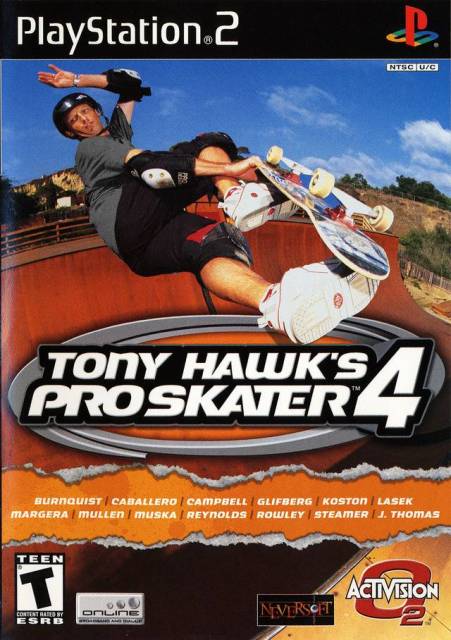
- Original Release (NA): 23/10/2002
- Not PS2 Exclusive (also has Xbox, GameCube, PlayStation 1, GBA, PC and Mac versions)
All right, time to get controversial. This is my favorite Tony Hawk game. Wait, that's not controversial at all, it's just an opinion. Well, then, I'll pretend it's the hottest of takes as an excuse to explain why it's my favorite a little more thoroughly. I'll admit that Tony Hawk's Pro Skater 3 was the peak of the series with regards to the series's skateboarding mechanics, which any right-minded person would consider to be the most vital aspect to get right in a skateboarding game. What THPS4 changes instead is the framework around those mechanics, of which it more or less leaves well enough alone save for a few useful tweaks like spine transfers. How challenges are set up, how freely the game lets you explore the map, what does and does not revolve around a strict time limit. By choosing to loosen the reins, THPS4 feels more inviting and laid-back, like a good skateboarding game should. It limits the time trials to the specific challenges that require them - such as earning a certain point total or a checkpoint race - as a good skateboarding game should. It gives you a checklist of "gaps" - high scoring tricks that usually require some part of the environment to pull off - and gives you the freedom outside of any specific challenge to go find them, and explore and experiment with the space in preparation for the high-score chasing to come. Like a good skateboarding game should. I sound like a broken record, but this one small tweak to an otherwise unremarkable and iterative entry in the THPS series was the key to unlocking a level of welcoming approachability that the demanding series had lacked before. I was never one for any actual skateboarding - weight issues and a lack of coordination would not have been kind to my joints and bones - but the scene always felt like it straddled the gap (so to speak) of sports professionalism and training, and a more breezy and irreverent form of self-expression that went hand-in-hand with flannel shirts and disrespecting the establishment. You can still score the highest combos and nail the toughest pipes in THPS4 with enough practice, but you could also unwind and have fun with no limits or requisites forced upon you. Later Tony Hawk games would continue in this vein, of course, but I might argue that they got progressively more off-track with the ridiculous antics of Bam Margera, playing mean pranks and far too much scatological humor, pushing the games further into frat boy territory. We won't get into the plastic skateboard peripheral games. We will assuredly not discuss THPS5 either.
Anyway, that was an unintentionally long-winded attempt to defend my personal ranking of the series, so here's me getting off the soapbox and quietly putting this game on the shelf before anyone can raise a ruckus. I have a lot of affection for the first four THPS skateboarding sims, and still regret to this day the direction they and their successors took. THPS5 in particular wounded me as deeply as anyone else, I suspect. Approved.
Case File 073: Rockstar North's Grand Theft Auto: Vice City
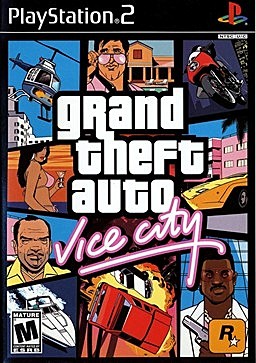
- Original Release (NA): 27/10/2002
- Not PS2 Exclusive (also has Xbox and PC versions)
The Grand Theft Auto series and I have never really seen eye-to-eye. I found the original 2D games fun for about half an hour, approximately the same amount of time it takes for me to get tired of Crazy Taxi, and the Grand Theft Auto 3 "trilogy" of GTA 3, Vice City and San Andreas never could draw me in with its gangster stories and obnoxious sense of humor. I did eventually play San Andreas out of curiosity, because the game was packed with more simulation aspects and a generally less serious tone (remember the jetpack?), but it was never enough to convince me to return to the previous two. After that, we had the tonally confused Grand Theft Auto IV which I really didn't care for, in part because I felt all the best elements of San Andreas were better represented in Volition's Saints Row series. Given the proliferation of the open-world city format since then, I've had zero inclination to even try GTA V, especially knowing that one of its characters is an unrepentant psychopath who tortures people.
Vice City might be my one exception to the "I'm done with Rockstar games forever" rule (along with any Bully sequels, of course) because I did regret missing out on a game so steeped in the 1980s, both musically and stylistically. I imagine it loses some of its novelty value after the fifteenth mission to drive a boatload of cocaine around the bay while wearing pastel jackets with the sleeves rolled halfway up, but I won't know until I try it out. Considered.
Case File 074: Check Six's Spyro: Enter the Dragonfly
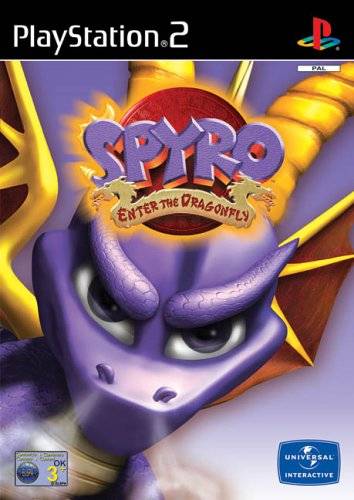
- Original Release (NA): 03/11/2002
- Not PS2 Exclusive (also came out on GameCube)
I got no beef with Spyro, but due to circumstances I've never really seen the series at its best. I skipped most of PlayStation 1 platformers due to being part of the N64 scene back when I could only have one console per generation, and so I lack that knowledge base for Spyro's early outings. Enter the Dragonfly was the first Spyro game to hit the PlayStation 2, but it had unfortunately lost its original developers - Insomniac Games, see the next entry below to find out what they were doing at this time - and the series suffered diminishing returns as a result from what I can tell. It seems like if you wanted to see Spyro at his best, you'd have been better off playing the first three games for PlayStation 1 and skipping everything else. I didn't think Enter the Dragonfly was particularly awful, but then I didn't have a whole lot of better Spyro games to compare it to. Did have a lot of better PS2 platformers to compare it to, however, including two of the games on this week's list along with last week's Ape Escape 2. As a result, the Spyro games have always been a footnote in the history of 3D platformers from my perspective.
Honestly, while I can barely recall the game or at least separate it in my mind from the marginally better A Hero's Tail (which was a rental, so don't expect to see it here), we already have an abundance of superior PS2 platformers heading towards the shelf. I might have to go back to those original PS1 platformers eventually for the sake of due diligence, but their rough younger brother doesn't belong here. Eliminated.
Case File 075: Insomniac Games's Ratchet & Clank
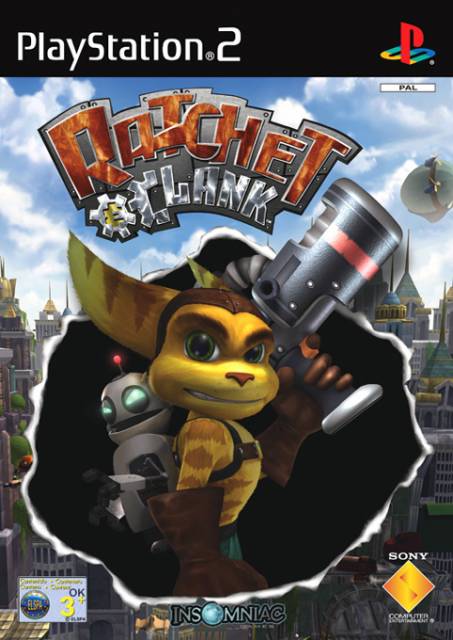
- Original Release (NA): 04/11/2002
- Not PS2 Exclusive (rereleased in a HD collection for PS3 and Vita)
This was the reason Insomniac moved on from Spyro. Ratchet and Clank is the first in what I might argue is the PlayStation 2's most significant mascot-based anything, Sony's own Mario or Sonic in so many words, and features a pair of spacefaring buddies saving the galaxy from an unscrupulous corporate overlord. The game combines traditional 3D platforming with a third-person shooter, emphasizing Ratchet's agility in combat as he sidesteps and leaps over attacks coming his way while retaliating in turn with a selection of weapons, which run the gamut of dull and reliable like a shotgun or grenades to unwieldy and hilarious like the Morph-O-Ray and Taunter. Each gun has its own experience levels, becoming stronger through constant use, so the game encourages players to constantly mix it up. While each of its levels has a linear structure, they'll often incorporate branches that lead off to side-objectives and other valuables, and there's a game-wide scavenger hunt for special golden collectibles, scattered blueprints for the ultimate weapon and odd "challenges" to pursue along with whatever story objective is demanding the spotlight. It's a great start for a consistently great series.
Which leads to my major problem here. The first Ratchet & Clank was an incredible introduction, but its two direct sequels for the PlayStation 2 are even better. The second game incorporates some fun spaceship fighting sequences, while the third adds a sort of team strategy mode where you're maneuvering AI units to fight larger battles. Both modes merge effortlessly within the R&C format, and the two games continue to expand the galaxy's lore and cast of ancillary characters in some fun ways once the duo's "origin story" has been resolved here. I'll be eliminating the first game in deference to the two that follow, but I clearly have a difficult decision ahead when it comes to finalizing my choice for the shelf. Eliminated.
Results
Man, I got a little defensive this week, huh? I think it's because I felt I had to justify my eliminations/considereds/approveds more than usual because the games were so well known and beloved to so many. They weren't so much my usual esoteric JRPG beauties as major headliners that almost everyone played in the day, and I've no doubt put someone out of sorts with each of the takes above. Still, though, I think I was generally pretty positive overall. Of the four eliminations this week, two of them were great games that were only passed over for their stronger sequels.
We're now at 28 out of 75 games to be considered for the second round, which is beginning to sound like a lot, as well as six confirmed victors boarding the express elevator to the top. Next week? Well, we'll see an unusually high number of games I simply couldn't figure out or irritated me to the point of quitting. To balance that out, however, we do also have The Greatest PlayStation 2 Game of All Time. A mixture of highs and lows, you might say.
